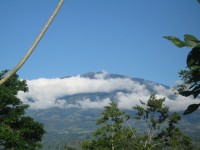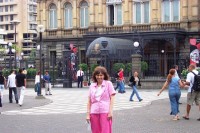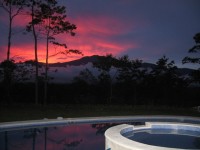 Who would have thought that 200 years later the descendants of those who left King George’s “Merry England” for freedom in the Americas would be looking for a new country to escape to. Yet hundreds of thousands of patriots are now leaving each year because they just don’t like what has happened in the land of their dreams. After all was not the theme of that Tea Party “No taxation without Representation?”
Who would have thought that 200 years later the descendants of those who left King George’s “Merry England” for freedom in the Americas would be looking for a new country to escape to. Yet hundreds of thousands of patriots are now leaving each year because they just don’t like what has happened in the land of their dreams. After all was not the theme of that Tea Party “No taxation without Representation?” Costa Rica has become one of the most popular destinations for those seeking freedom. And there are many good reasons for it. A stable government since 1948 is one good reason. A climate that rarely sees temperatures lower than 65 or higher than 85 is another, and the smiling, happy, friendly people are more good reasons to consider Costa Rica as a place to retire and invest. San Jose has some of the finest restaurants in the world. Choose from French, Italian, Japanese, Lebanese, and many other cuisines. There are wonderful hotels and resorts, as well as the National Theater with its concerts and several English speaking little theater groups. There are help organizations like Casa Canada and the Association of Residents and Costa Rica (arcr.net) There are even large modern malls and mega supermarkets where you can buy North American foods.
The first European explorer to discover Costa Rica was Christopher Columbus in 1502. His name in Spanish is Cristobal Colon and it is from that name that the Costa Rican Currency is now called the colon. The main street of the capital San Jose is Passeo Colon and there are many towns and villages named to honor him. A little later came a Spanish explorer named Gil Gonzalez Davila who was inspired by the golden earrings of the local Carib Indians to call the area Costa Rica or Rich Coast.
Costa Rica along with Mexico fought for independence from Spain in 1821 and has been an independent republic since that time. There was a civil war in 1948 but since then Costa Rica has been a very peaceful country with a stable government and fair elections. There is no army and the police force is quite benign. While the government is stable it is not dictatorial. There is corruption but that is just a way of life in Central and South America and here they admit it instead of trying to cover it up. Taxes are very low. We pay less than $200 a year for a large home and 2.5 acres of land. For empty lots bought for investment, we pay $8 per year. Electricity to run a large home and pool comes to less than $200 a month and phones are a nominal $8 a month while food prices are about 30% less than in Florida. A loaf of wonderfully crisp bread for instance costs about 50 cents and a tender fillet steak is about $3.00.
We first started looking around for a new home country about ten years ago when we saw the way things were going in the United States. We needed a country where the cost of living was relatively low and homes were reasonably priced. That immediately cut out Europe, Australia and most other countries. We looked at South America and decided that the frequent coups, military dictatorships and wars were not conducive to retirement. Finally we looked at Mexico (too much crime and drug-wars), Panama and Costa Rica. Panama was too close to Chavez in Venezuela and we also heard from those who had visited that it was dangerous and that foreigners were no longer as welcome as they once had been. So that left Costa Rica.
We were not immediately impressed. We had opted for a “bargain” package that we later found included a run-down hotel and a very poor quality car. We were supposed to be met at the airport but nobody showed up so we had to take a taxi to the hotel. We found the maze of expressways and streets very difficult to navigate without good maps and signs. But on our second visit things became easier and more enjoyable. We found San Jose and the Central Valley to be over populated, traffic clogged and polluted. Then we looked beyond the Central Valley and found things were very different. In the mountains less than two hours from San Jose the land was beautiful and the people very laid-back and friendly. Small farms of vegetables, coffee and sugar cane dotted the landscape and the road was very well maintained.
Costa Rica has become one of the most popular destinations for those seeking freedom. And there are many good reasons for it. A stable government since 1948 is one good reason. A climate that rarely sees temperatures lower than 65 or higher than 85 is another, and the smiling, happy, friendly people are more good reasons to consider Costa Rica as a place to retire and invest. San Jose has some of the finest restaurants in the world. Choose from French, Italian, Japanese, Lebanese, and many other cuisines. There are wonderful hotels and resorts, as well as the National Theater with its concerts and several English speaking little theater groups. There are help organizations like Casa Canada and the Association of Residents and Costa Rica (arcr.net) There are even large modern malls and mega supermarkets where you can buy North American foods.
The first European explorer to discover Costa Rica was Christopher Columbus in 1502. His name in Spanish is Cristobal Colon and it is from that name that the Costa Rican Currency is now called the colon. The main street of the capital San Jose is Passeo Colon and there are many towns and villages named to honor him. A little later came a Spanish explorer named Gil Gonzalez Davila who was inspired by the golden earrings of the local Carib Indians to call the area Costa Rica or Rich Coast.
Costa Rica along with Mexico fought for independence from Spain in 1821 and has been an independent republic since that time. There was a civil war in 1948 but since then Costa Rica has been a very peaceful country with a stable government and fair elections. There is no army and the police force is quite benign. While the government is stable it is not dictatorial. There is corruption but that is just a way of life in Central and South America and here they admit it instead of trying to cover it up. Taxes are very low. We pay less than $200 a year for a large home and 2.5 acres of land. For empty lots bought for investment, we pay $8 per year. Electricity to run a large home and pool comes to less than $200 a month and phones are a nominal $8 a month while food prices are about 30% less than in Florida. A loaf of wonderfully crisp bread for instance costs about 50 cents and a tender fillet steak is about $3.00.
We first started looking around for a new home country about ten years ago when we saw the way things were going in the United States. We needed a country where the cost of living was relatively low and homes were reasonably priced. That immediately cut out Europe, Australia and most other countries. We looked at South America and decided that the frequent coups, military dictatorships and wars were not conducive to retirement. Finally we looked at Mexico (too much crime and drug-wars), Panama and Costa Rica. Panama was too close to Chavez in Venezuela and we also heard from those who had visited that it was dangerous and that foreigners were no longer as welcome as they once had been. So that left Costa Rica.
We were not immediately impressed. We had opted for a “bargain” package that we later found included a run-down hotel and a very poor quality car. We were supposed to be met at the airport but nobody showed up so we had to take a taxi to the hotel. We found the maze of expressways and streets very difficult to navigate without good maps and signs. But on our second visit things became easier and more enjoyable. We found San Jose and the Central Valley to be over populated, traffic clogged and polluted. Then we looked beyond the Central Valley and found things were very different. In the mountains less than two hours from San Jose the land was beautiful and the people very laid-back and friendly. Small farms of vegetables, coffee and sugar cane dotted the landscape and the road was very well maintained.
 Real Estate people has already shown us the little houses of the Central Valley with bars on the windows and no space between the homes. They had tried to entice us to the North American style developments where again the homes were far too close together. Now we found that for less money we could buy a few acres of land, build a house, and live without bars because there is really no crime in the country area. The air is fresh and clean and the mountain views are what dreams are made of. We finally settled on the small farming town of Turrialba turrialbalife.com and nearby we found what we were looking for. We bought 22 acres of beautiful coffee and trees with streams and waterfalls and started to build our first house. Since then we realized that 22 acres was far more than we needed and that we really needed the company of some English speaking neighbors. So we divided the land into 3 acre lots and started offering it to others to share with us.
Costa Rica is not perfect. There are some difficulties with the language and local customs, but we soon learned to get by. The main supermarket is 30 minutes away as is the hospital and the banks.. But we are finding it to be a wonderful place to retire on a modest income. The government does not bother us. We don’t even notice the taxes. The people are friendly and the local wages are such that if we pay our workers $2.00 per hour they are very happy and loyal. And by the way, this is one place in the world where the dollar is actually worth more than it was a year ago. Back then the exchange rate was 490 colones to the dollar. Now it is 560.
Costa Rica ranks number four for satisfaction with health care in the world. The United States is number 39. Costa Rica also ranks in the top ten in the world for general happiness of its people. Our own experience of the health care system is that every doctor we have visited including six or seven specialists has been of far higher quality than any we had in the U.S. and the fees are about equal to the co-pays we had to make back home.
Real Estate people has already shown us the little houses of the Central Valley with bars on the windows and no space between the homes. They had tried to entice us to the North American style developments where again the homes were far too close together. Now we found that for less money we could buy a few acres of land, build a house, and live without bars because there is really no crime in the country area. The air is fresh and clean and the mountain views are what dreams are made of. We finally settled on the small farming town of Turrialba turrialbalife.com and nearby we found what we were looking for. We bought 22 acres of beautiful coffee and trees with streams and waterfalls and started to build our first house. Since then we realized that 22 acres was far more than we needed and that we really needed the company of some English speaking neighbors. So we divided the land into 3 acre lots and started offering it to others to share with us.
Costa Rica is not perfect. There are some difficulties with the language and local customs, but we soon learned to get by. The main supermarket is 30 minutes away as is the hospital and the banks.. But we are finding it to be a wonderful place to retire on a modest income. The government does not bother us. We don’t even notice the taxes. The people are friendly and the local wages are such that if we pay our workers $2.00 per hour they are very happy and loyal. And by the way, this is one place in the world where the dollar is actually worth more than it was a year ago. Back then the exchange rate was 490 colones to the dollar. Now it is 560.
Costa Rica ranks number four for satisfaction with health care in the world. The United States is number 39. Costa Rica also ranks in the top ten in the world for general happiness of its people. Our own experience of the health care system is that every doctor we have visited including six or seven specialists has been of far higher quality than any we had in the U.S. and the fees are about equal to the co-pays we had to make back home.
David Rushton was born in London where his parents were staunch conservatives. He immigrated to the United States in the sixties and formed a patriotic organization advocating conservative principles which include rallies and marches. He had his own radio talk show for many years and was also a guest on many radio and Television talk shows.
In the last few years David wrote several books about the dangers of radical Islam and spoke on this subject in some of the largest Conservative Churches in the United States.
He now resides with his wife Marcia in Costa Rica.